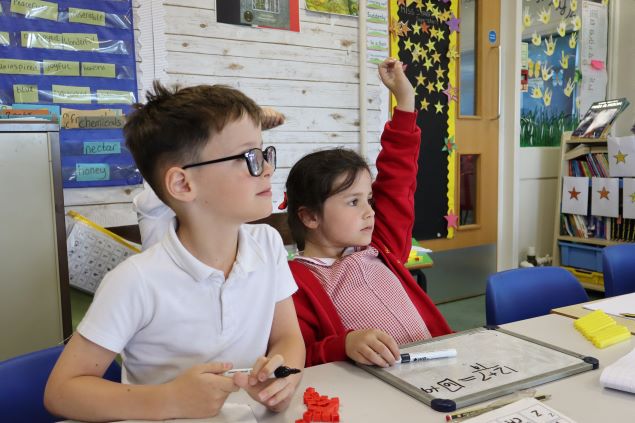Maths
| Mathematics |
| Intent |
| Maths
Mathematics is a creative and highly inter-connected discipline that has been developed over centuries, providing the solution to some of history’s most intriguing problems. It is essential to everyday life, critical to science, technology and engineering, and necessary for financial literacy and most forms of employment. A high-quality mathematics education therefore provides a foundation for understanding the world, the ability to reason mathematically, an appreciation of the beauty and power of mathematics, and a sense of enjoyment and curiosity about the subject. We aim to provide the children with a mathematics curriculum which will allow them to become confident individuals through developing their mathematical skills to their full potential. We also aim to present maths as a challenging, exciting, creative and relevant subject in order to promote a positive and confident attitude. We aim to ensure all pupils: · Become fluent in the fundamentals of mathematics, including through varied and frequent practice with increasingly complex problems over time, so that pupils develop conceptual understanding and the ability to recall and apply knowledge rapidly and accurately · Reason mathematically by following a line of enquiry, conjecturing relationships and generalisations, and developing an argument, justification or proof using mathematical language · Can solve problems by applying their mathematics to a variety of routine and non-routine problems with increasing sophistication, including breaking down problems into a series of simpler steps and persevering in seeking solutions · Reason mathematically by following a line of enquiry, conjecturing relationships and generalisations, and developing an argument, justification or proof using mathematical language · Can solve problems by applying their mathematics to a variety of routine and non-routine problems with increasing sophistication, including breaking down problems into a series of simpler steps and persevering in seeking solutions.
|
| Implementation |
| In Hollins Grundy, children study mathematics daily covering a broad and balanced curriculum including elements of number, calculation, geometry, measure and statistics. Alongside our daily mathematics sessions, an additional 10 minutes a day are spent focussing on daily arithmetic to build fluency.
We aim for each child to be confident in the yearly objectives and develop their ability to use this knowledge to develop a greater depth of understanding to solve a problem solving and reasoning questions. We carefully consider each child’s starting point and how they learn best to ensure that there are opportunities for children of all abilities, including those with SEND to make good progress from their starting point in Maths. Schools in England are now required to administer an online multiplication check (MTC) to year 4 pupils. The purpose of the MTC is to determine whether pupils can recall their times tables fluently. In Early Years, children learn through a mixture of adult led activities and child-initiated activities both inside and outside of the classroom, providing them with opportunities to develop their skills in counting, understanding and using numbers, calculating addition and subtraction problems; and to describe shape, space and measure. Areas of provision within the classroom support maths, ensuring children are able to access them throughout the day to practise and develop skills taught. In addition, consistent, daily maths lessons take the form of direct teaching, enhanced by activities placed in areas of provision in the classroom, which may be accessed independently or supported by an adult. |
| Impact |
| We assess the impact of our teaching in maths by tracking children’s progress using our curriculum intent grid for maths. Throughout each lesson, feedback is given to children through marking and next steps to ensure they are meeting the lesson objectives. Small end of unit assessments are used to inform future planning, and to ensure children are making progress. We monitor their learning as evidenced in their maths books, learning walks and through lesson observations.
Key Stage 1 use previous SAT papers (Year 2) whilst in Key Stage 2 use NFER tests (Year 3, 4 and 5) and previous SATs papers (Year 6). This assessment is used to determine children’s progress and attainment, and inform teaching. At the end of Key Stage 1, children take national statutory SAT tests which inform a Teacher Assessment judgement. At the end of Year 4, children will take the Y4 Multiplication Check. At the end of Key Stage 2, children take national statutory SAT tests. |
Downloads
 Maths Policy
Maths Policy Curriculum Intent Grid Maths (2024 Sonar)
Curriculum Intent Grid Maths (2024 Sonar) Maths Long Term Plan 2022 23
Maths Long Term Plan 2022 23 Mathematics scheme
Mathematics scheme Maths Vocabulary Reception
Maths Vocabulary Reception Early Learning Goals Reception
Early Learning Goals Reception Key Stage 1 Maths Glossary
Key Stage 1 Maths Glossary Year 3 and 4 Maths Glossary
Year 3 and 4 Maths Glossary Year 5 and 6 Maths Glossary
Year 5 and 6 Maths Glossary Calculation Policy Addition hg.docx
Calculation Policy Addition hg.docx Calculation Policy Subtraction (1).docx
Calculation Policy Subtraction (1).docx Calculation Policy Multiplication
Calculation Policy Multiplication Calculation Policy Division.docx
Calculation Policy Division.docx



